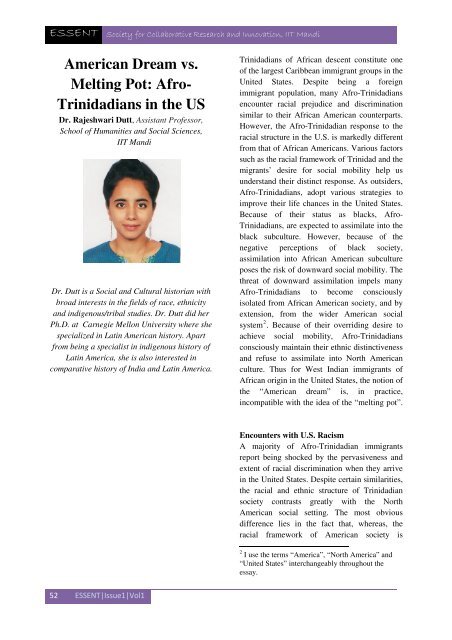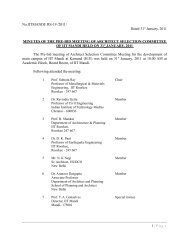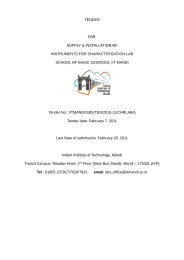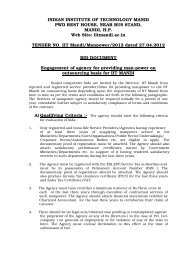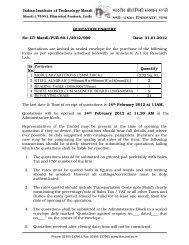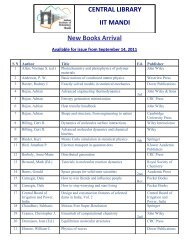ESSENT Society for Collaborative Research and Innovation, <strong>IIT</strong> <strong>Mandi</strong>American Dream vs.Melting Pot: Afro-Trinidadians in the USDr. Rajeshwari Dutt, Assistant Professor,School of Humanities and Social Sciences,<strong>IIT</strong> <strong>Mandi</strong>Dr. Dutt is a Social and Cultural historian withbroad interests in the fields of race, ethnicityand indigenous/tribal studies. Dr. Dutt did herPh.D. at Carnegie Mellon University where shespecialized in Latin American history. Apartfrom being a specialist in indigenous history ofLatin America, she is also interested incomparative history of India and Latin America.Trinidadians of African descent constitute oneof the largest Caribbean immigrant groups in theUnited States. Despite being a foreignimmigrant population, many Afro-Trinidadiansencounter racial prejudice and discriminationsimilar to their African American counterparts.However, the Afro-Trinidadian response to theracial structure in the U.S. is markedly differentfrom that of African Americans. Various factorssuch as the racial framework of Trinidad and themigrants’ desire for social mobility help usunderstand their distinct response. As outsiders,Afro-Trinidadians, adopt various strategies toimprove their life chances in the United States.Because of their status as blacks, Afro-Trinidadians, are expected to assimilate into theblack subculture. However, because of thenegative perceptions of black society,assimilation into African American subcultureposes the risk of downward social mobility. Thethreat of downward assimilation impels manyAfro-Trinidadians to become consciouslyisolated from African American society, and byextension, from the wider American socialsystem 2 . Because of their overriding desire toachieve social mobility, Afro-Trinidadiansconsciously maintain their ethnic distinctivenessand refuse to assimilate into North Americanculture. Thus for West Indian immigrants ofAfrican origin in the United States, the notion ofthe “American dream” is, in practice,incompatible with the idea of the “melting pot”.Encounters with U.S. RacismA majority of Afro-Trinidadian immigrantsreport being shocked by the pervasiveness andextent of racial discrimination when they arrivein the United States. Despite certain similarities,the racial and ethnic structure of Trinidadiansociety contrasts greatly with the NorthAmerican social setting. The most obviousdifference lies in the fact that, whereas, theracial framework of American society is2 I use the terms “America”, “North America” and“United States” interchangeably throughout theessay.52 ESSENT|Issue1|Vol1
ESSENT Society for Collaborative Research and Innovation, <strong>IIT</strong> <strong>Mandi</strong>dichotomous, i.e. black versus white racerelations, Trinidadian society exhibits a morecomplex racial hierarchy. Of course, this is notto deny the existence of Asians or Hispanics inthe U.S., who are not phenotypically, black orwhite. However it can be argued that the majorrace relations question in the U.S. is recognizedto be the conflict between blacks and whites. Incontrast, in Trinidad, the recognized racialconflict is the one that exists between Afro- andIndo-Trinidadians. Despite the existence ofracial tensions in Trinidad, however, theabsence of a majority white population rendersrace relations in the region qualitativelydifferent from the kind prevalent in the UnitedStates.The differential experience of first-generationAfro-Trinidadian immigrants also lends them aracial and cultural perspective distinct from thatof American-born blacks. For instance, in ReuelRoger’s study of Afro-Caribbean immigrants,the majority of interviewees attributed successin the area of occupation to hard work and didnot perceive racism as an all-pervading obstacleto social mobility. In contrast, African Americaninterviewees exhibited a much higher degree ofracial consciousness (Foner 2001: 178).As immigrants, Afro-Trinidadians, also act froma different set of aspirations and expectationsthan African Americans. Waters writes that,“the achievement ideology of the West Indiansprepares them to battle to succeed in the UnitedStates” (Waters, 159). Indeed, many researchershave argued that because immigrants are a selfselectedgroup, they possess a higher degree ofmotivation and drive for social mobility thanAfrican Americans do (Butcher, 267). Byadopting various strategies, Afro-Trinidadiansaim to improve their life chances and to achievesocial mobility in the racially structuredAmerican society that they encounter.Collective StrategiesCollective methods for ameliorating lifeconditions of Afro-Trinidadians in the U.S.consist mainly of establishing social networksbased on kinship ties with other Afro-Trinidadian immigrants. Christine Ho’s study ofAfro-Trinidadians in Los Angeles is particularlyilluminative in understanding the role of kinshipnetworks in the lives of these immigrants. Hofound that relatives fulfilled importantinstrumental functions for Afro-Trinidadians inthe U.S. In material terms; family membersoften assisted newly arrived immigrants withfinancial support and in finding jobs. In manycases, Afro-Trinidadians come to the U.S.through the sponsorship of a relative whoalready lives here. Indeed, many researcherscharacterize Afro-Trinidadian migration toNorth America as “chain migration” whereimmigrants follow their family members intothe United States. In fact, from the outset,family members provide material support forimmigrants.Social networks also lend Afro-Trinidadianimmigrants a certain degree of psychologicalsupport. Vilna Bashi refers to the mechanism of“psychological insulation” that kinship networksprovide immigrants against the racism in thewider society. (Cordero-Guzman, 229).Among Afro-Trinidadian immigrants, women,in particular, actively participate in maintainingkinship networks both within the United Statesand between the U.S. and Trinidad. Caribbeanwomen immigrants differ from other immigrantwomen in the sense that many of them enter theU.S. as “principal aliens” and as such, areresponsible for providing for their families.Christine Ho points out that “this factcontradicts the popular assumption thatimmigrants are men and dependents are womenand children” (Ho, 1993: 33). Christine Ho’sfindings reveal that women rather than men aremore prone to keeping in touch with relatives inTrinidad. Ho points to a “system of reciprocity”whereby Afro-Trinidadian women immigrantssend remittances to family members in Trinidad,while relatives in Trinidad help out with raisingtheir children. She writes that, “almost twice asmany women (54%) as men (26%) in thesample send remittances to mothers, aunts and53 ESSENT|Issue1|Vol1


